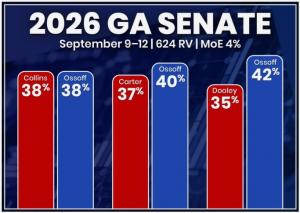*NEW QUANTUS INSIGHTS POLL* Georgia’s 2026 Senate Race Is Wide Open
Ossoff on Shaky Ground in Georgia. Nearly half of Georgia says it’s time for a change, as Republicans search for a champion.
Nearly half of Georgia says it's time for a change.”
ANDOVER, MN, UNITED STATES, September 15, 2025 /EINPresswire.com/ -- The battle for Georgia’s Senate seat in 2026 will not be settled by personality or polish, but by pocketbooks and priorities. Jon Ossoff enters the race as a freshman senator who has not yet secured his footing with the people. His approval numbers are not disastrous, but they are soft — 47 percent approve, 37 percent disapprove, and 16 percent cannot make up their minds. When it comes to the Democrat Senator, nearly half of Georgians say flatly: it is time for a change. That is the mark of an incumbent in peril. (See cross tabs and presentation here.)— Jason B. Corley
The economy stands above every other issue like an 800-pound gorilla. A majority, 53 percent, call the cost of living and inflation the greatest problem facing the state. Groceries, housing, and taxes are the pain points. When asked what the next senator should do to cut costs, the answer was not new programs or new agencies, but one thing: cut taxes on working families. The people want relief, not rhetoric. The Republican who speaks directly to this burden will have an open field.
Immigration and crime follow close behind, and here the numbers are decisive. More than half of Georgians support deportations of undocumented immigrants. Three in four back the Laken Riley Act. Only 31 percent believe Ossoff has done enough to secure the border. On these questions, the GOP has the high ground. Voters give Republicans a 17-point advantage over Democrats on crime and illegal immigration. By contrast, on the economy and inflation, the parties fight to a draw.
The Republican field, however, is unsettled. Mike Collins shows the strongest early position. Buddy Carter is close behind. Derek Dooley, the outsider coach, has potential but lags in electability. Yet the striking fact is this: six in ten voters cannot name which Republican has the best shot to unseat Ossoff. That tells us two things — the GOP has not chosen its champion, and the perception of electability is still wide open.
The ballot tests underscore Ossoff’s weakness. Against Collins, the race is dead even at 38 percent apiece. Against Carter, Ossoff clings to a 40 to 37 lead. Against Dooley, Ossoff leads 42 to 35. In every case, nearly one in five voters remains undecided. Collins has the strongest hand. Carter is competitive. Dooley is trailing, but with the undecideds this high, he is far from out of the fight.
Independents will decide this race. They are disillusioned with Ossoff but unconvinced about the Republicans. They make up much of the undecided bloc in every matchup. Whichever Republican can marry an economic message of relief with credibility on immigration and security will carry this center ground and the election.
Then there is the Trump question. Half of Georgians say their next senator should act independently of the former president. Four in ten want him to work closely with Trump. This is no even split. The nominee who leans too far one way risks alienating the other. The task is balance — showing loyalty without losing independence, appealing to the Trump base without surrendering the middle.
Taken together, the meaning is plain. Ossoff is vulnerable. He is soft on the economy, exposed on immigration, and shaky with independents. But Republicans have not yet united. Their task is twofold: settle the question of electability within their own ranks, and hammer day after day on inflation, immigration, and change. The lesson of September 2025 is this: Georgia’s Senate seat can be taken. But only if Republicans sharpen their message, rally the undecided, and crown a champion.
Quantus Insights is a premier provider of polling, election forecasting, economic analysis, and advanced modeling. Our mission is clear: to provide political and economic intelligence that influences decision-making in elections and public policy.
Jason B. Corley is a former intelligence community professional with over 15 years of experience in all-source analysis and national security. He served eight years in the U.S. military as an intelligence analyst, including deployment as a tactical intelligence operator during the Iraq War. After transitioning from government service, he moved into the private sector, leading strategic initiatives in cyber defense and information security. His work has spanned OSINT, incident response, MDR/EDR, and business development in high-risk, data-driven environments. He is the co-founder and Lead Pollster at Quantus Insights, where he specializes in election forecasting, political polling, and predictive analytics. Across every role, he brings a sharp focus on problem-solving, execution, and building systems that drive results.
Jason Corley
Quantus Insights
+1 702-374-3308
contact@quantusinsights.org
Visit us on social media:
X
Legal Disclaimer:
EIN Presswire provides this news content "as is" without warranty of any kind. We do not accept any responsibility or liability for the accuracy, content, images, videos, licenses, completeness, legality, or reliability of the information contained in this article. If you have any complaints or copyright issues related to this article, kindly contact the author above.

